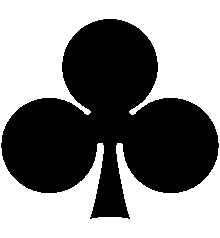 at
level 3
at
level 3 , if a player
bids 4
, if a player
bids 4 he
controls
he
controls  but he does not
control
but he does not
control  .
In other words, counter to classical controls, he controls the cheaper color(s) but he does not
control the color that he bids.
.
In other words, counter to classical controls, he controls the cheaper color(s) but he does not
control the color that he bids.
The negative controls or anti controls are the opposite of the classical (or positive controls.
For instance
after a an agreed fit  at
level 3
at
level 3 , if a player
bids 4
, if a player
bids 4 he
controls
he
controls  but he does not
control
but he does not
control  .
In other words, counter to classical controls, he controls the cheaper color(s) but he does not
control the color that he bids.
.
In other words, counter to classical controls, he controls the cheaper color(s) but he does not
control the color that he bids.
The most part of players use the classical controls which are generally sufficient. But occasionally the negative controls are necessary as complement. Here are some examples.
1 |
1 |
3 |
4 (control
(control  ,
but no ,
but no  ) ) |
4 (what means ?) (what means ?) |
What may mean the bid 4 by opener?
by opener?
After 4 which denies
control
which denies
control  . If the opener
had no control
. If the opener
had no control  , he would have closed
to 4
, he would have closed
to 4 .
.
If he had control  and
and  the opener would have bidded 4NT Blackwood,
since the responder has
control
the opener would have bidded 4NT Blackwood,
since the responder has
control 
Therefore, the bid 4 is a negative control which means
that the opener has contol
is a negative control which means
that the opener has contol  but no
control
but no
control  ,
and requires the responder to bid 4NT Blackwood if he has
control
,
and requires the responder to bid 4NT Blackwood if he has
control  , if not to close
to 4
, if not to close
to 4
On the other hand, if the responder bids the control  instead
of 4
instead
of 4 , all is classical :
, all is classical :
- After 4 ,
if the opener bids 4
,
if the opener bids 4 , it is a
classical control which denies the control
, it is a
classical control which denies the control  , because
if he had controls
, because
if he had controls  and
and  he would have bidded 4NT
Blackwood instead of 4
he would have bidded 4NT
Blackwood instead of 4 . This
bid 4
. This
bid 4 requires the opener
to bid 4NT whith control
requires the opener
to bid 4NT whith control  , if not to close
at 4
, if not to close
at 4 .
.
- After 4 , if the opener
bids 4
, if the opener
bids 4 , it is also a
classical control which denies the
control
, it is also a
classical control which denies the
control  . This bid
4
. This bid
4 requires the responder to bid 4NT whith
control
requires the responder to bid 4NT whith
control  , if not to close
at 4
, if not to close
at 4 .
.
As rule, a negative control may only be necessary when the first bidded control denies at least
a control in cheapers color. The most often when
control  is denied but no always.
is denied but no always.
By previous example, if the opener opens 1 instead of 1
instead of 1 , no change :
, no change :
1 |
1 |
3 |
4 (control
(control  , but no , but no
 ) * ) * |
4 (no
control (no
control  ). End ). End |
|
4 (control (control
 ,
but no ,
but no  ) ** ) ** |
|
4NT(control  and
and  ) ** ) ** |
* The opener has opened 1 but has not
inevitably the control
but has not
inevitably the control  . The
bid 4
. The
bid 4 is a control, but
does not mean inevitably a double fit
is a control, but
does not mean inevitably a double fit  and
and  .
.
** 4 is a negative control which requires the
responder to bid 4NT whith control
is a negative control which requires the
responder to bid 4NT whith control  , if not to
close at 4
, if not to
close at 4 .
.
This case occurs not so often by fit 44 at  , because
the control
, because
the control  is at disposal. But this may
also occur. For instance :
is at disposal. But this may
also occur. For instance :
1 |
1 |
3 |
4 (control
(control  , but no , but no
 ) ) |
4 (no control
(no control  ). End ). End |
4 (control
(control  , but
no , but
no  ) * ) * |
4NT (control  and
and  ) ) |
* 4 is a negative control which requires the
partner to bid 4NT Blackwood if he controls
is a negative control which requires the
partner to bid 4NT Blackwood if he controls  , if not to
close at 4
, if not to
close at 4 .
.
When the fit 44 in a major is agreed at level 2, some players have better the bid 3NT as requiring a first control, but this does not change anything :
1 |
1 |
3 |
3NT (requires controls) |
4 (control
(control  , but
no , but
no  ) ) |
|
4 (no
control (no
control  ). End ). End |
|
4 (control
(control  but
no but
no  ) * ) * |
|
4NT(control  and
and  ) ) |
* 4 is a negative control which requires the
opener to bid 4NT whith control
is a negative control which requires the
opener to bid 4NT whith control  , if not to close
at 4
, if not to close
at 4
1 |
2 |
| 2SA(strong 15HCP+) | 3 (fit and slam hope) (fit and slam hope) |
4 (control
(control  but
no but
no  ) ) |
|
4 (no
control (no
control  ). End ). End |
|
4 (control
(control  ,
but no ,
but no  ) * ) * |
|
4NT (contrôle  ,
and ,
and  ) ) |
*  is a negative control which requires
the partner to bid 4NT with control
is a negative control which requires
the partner to bid 4NT with control  , if not to close
at 4
, if not to close
at 4
After 3 by responder, the opener has at his
disposal the bid 3NT to show the bad quality of his trumps.
by responder, the opener has at his
disposal the bid 3NT to show the bad quality of his trumps.
and :
1 |
2 |
| 2NT(strong 15HCP+) | 3 (fit and slam hope) (fit and slam hope) |
4 (control
(control  but
no but
no  ) ) |
|
4 (no
control (no
control  ). End ). End |
|
4 (control
(control  ,
but no ,
but no  ) * ) * |
|
4NT (control  ,
and ,
and  ) ) |
*  is also a negative control.
is also a negative control.
By opening 1 and
fit
and
fit  , the opener has the control
bid 3
, the opener has the control
bid 3 at his disposal. But a negative control may
be necessary. Example :
at his disposal. But a negative control may
be necessary. Example :
1 |
2 |
| 2NT(strong 15HCP+) | 3 (fit and slam hope) (fit and slam hope) |
4 (control
(control  but
no but
no  ) * ) * |
4 (no control
(no control  ). End * ). End * |
4 (control
(control  , but
no , but
no  ) ** ) ** |
|
4NT (control  , and , and
 ) ) |
* The opener had the control bid 3 at his disposal but
has not used it. He has no control
at his disposal but
has not used it. He has no control  .
.
** 4 is a negative control which requires the
responder to bid 4NT with control
is a negative control which requires the
responder to bid 4NT with control  , if not to
close at 4
, if not to
close at 4 .
.
1 |
4 (Splinter) (Splinter) |
4 (anti control) * (anti control) * |
|
| 4SA (Blackwood) ** |
* Control  but no
but no 
** Control  and
and

Idem after 1 -
1
-
1 -
4
-
4 (splinter)
(splinter)
* Chose mode "Read" is more convenient for reading, but the printing result isthen poor.
** Choose mode "Print" is necessary for perfect printing. This mode may also be used for full scren reading.
Once mode "Print" has been selected, use the command Print of your computer
maubird at orange.fr
AM